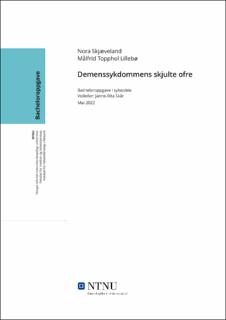| dc.contributor.advisor | Skår, Janne-Rita | |
| dc.contributor.author | Skjæveland, Nora | |
| dc.contributor.author | Lillebø, Målfrid Topphol | |
| dc.date.accessioned | 2022-09-02T17:21:00Z | |
| dc.date.available | 2022-09-02T17:21:00Z | |
| dc.date.issued | 2022 | |
| dc.identifier | no.ntnu:inspera:112446249:114087727 | |
| dc.identifier.uri | https://hdl.handle.net/11250/3015524 | |
| dc.description.abstract | Hensikt: Hensikten med oppgaven er å tilegne oss kunnskap og belyse hvordan pårørende erfarer å ha et familiemedlem med demens, og hvordan de opplever hele prosessen med omplassering til sykehjem.
Metode: En systematisk litteraturstudie med åtte forskningsartikler. Én «review», én kvantitativ og seks kvalitative artikler ble inkludert i studien.
Resultat: Pårørende har en rekke følelser og forventninger knyttet til å flytte et familiemedlem med demens til sykehjem. Følelsen av skyld, og hvilken rolle de pårørende går inn i justeres ut fra helsepersonellets samarbeid og omsorgsrolle.
Konklusjon: Funnene viser at det viktigste for de pårørende var at familiemedlemmet med demens fikk god omsorg på sykehjemmet. Det er en svært belastende situasjon å gi fra seg omsorgsrollen, og det er viktig at sykepleier lytter til deres følelser og erfaringer. Det ble uttrykt mangel på kunnskap om diagnosen fra pårørende. Sykepleier burde kartlegge hva pårørende ønsker mer informasjon og kunnskap om, og planlegge veien videre. | |
| dc.description.abstract | Aim: The purpose of this assignment is to acquire knowledge and shed light on how relatives experience having a family member with dementia, and how they feel about the whole process of relocating their family member to a nursing home.
Method: A systematic literature study with eight research articles. One rewiew, one quantitative and six qualitative articles where included in this study.
Results: The relatives have several emotions and expectations associated with moving a family member with dementia to a nursing home. Emotions such as guilt, and which role the relative’s step into are adjusted based on the health personnels cooperation and caring role. Effective communication and information were important for the relatives.
Conclusion: The findings show that the most important thing for the relatives was that their family members with dementia received diligent care at the nursing home. Giving up the caring role is an incredibly stressful situation, and it is important that the nurse listen to their feelings and experiences. The relatives expressed lack of knowledge about the diagnosis. The nurse should find out what the relatives want more knowledge and information about and plan the way forward. | |
| dc.language | nob | |
| dc.publisher | NTNU | |
| dc.title | Demenssykdommens skjulte ofre | |
| dc.type | Bachelor thesis | |
